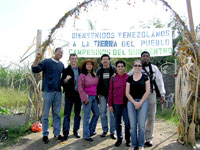City farmers fight to feed community
By
Jefferson Azevedo
Los Angeles
Published Nov 18, 2005 10:13 PM
The farmers of South
Central Los Angeles are in a battle to keep alive a dream that became reality.
One of the few, and the biggest, community farms in the city of Los Angeles is
about to—if the will of the courts and the developers prevail—give
way to a warehouse. The farm, in one of the most oppressed and neglected areas
of California, is an oasis and an example of what the people can do when they
are united.
|
Banner welcomes Venezuelan
guests to farm.
|
The land in dispute is an area of 14 acres just a few miles
from the heart of downtown. It was expropriated by the city and given to the
South Central community after the 1992 uprising that followed the non-guilty
verdict of a wealthy jury that freed four police officers who almost killed
Rodney King, as recorded on videotape. The city government, knowing that the
reaction of the people was not just because of the verdict but also because of
the conditions lived in and the oppression they had been suffering for a long
time, gave the land to the people to operate as a community farm while the world
still had its spotlight on Los Angeles.
The farmers transformed the vast
wasteland located on the corner of Alameda and 41st streets into one of the most
beautiful places in the city. They grow tomatoes, corn, sugar cane, cactus and
foods from Meso-America which are unavailable elsewhere in Los Angeles.
Now, 13 years later, after the spotlight of the world was turned in other
directions, the city government sold back the land to the old owner in a shady
deal. The South Central community was not even given a chance to match the price
set by the city government. It is important to note that the buyer had donated
money to the campaigns of some of the local politicians.
Rufina
Juárez, one of the organizers of the South Central farmers, spoke at a
recent evening of solidarity here with Bolivarian Venezuela, an event sponsored
by the International Action Center and other progressive organizations. She
uncovered the lies that were spread by some of the corporate media and urged
solidarity with the farmers’ struggle. The people present were touched by
her words and gave her a standing ovation. A delegation from Venezuela recently
visited the farm and found similarities to their own struggle for
self-determination.
In my visits to this wonderful piece of land, I, like
everyone else who had the joy to visit it, was amazed by the fact that the city
is trying to shut down such a great example of community work.
But, when
you stop to think, many reasons come out. The farm is an answer to the racist
lie that poor people are poor because they are lazy and not intelligent. It is
also a playground where the children of the working-class family can play, free
of the pollution and dangers of many public parks. It’s a place where
arts, music, games and celebrations happen in a way that brings the
working-class people closer to each other, a place where more than 350 families
are fed at no cost to the city, and a place where people from all over the
Americas can keep their traditions alive and pass them on to their
children.
And most of all: a place where the proletariat may realize, like
the farmers of South Central did, that the land belongs to them, for they were
there before the developers and therefore they will not leave.
Articles copyright 1995-2012 Workers World.
Verbatim copying and distribution of this entire article is permitted in any medium without royalty provided this notice is preserved.
Workers World, 55 W. 17 St., NY, NY 10011
Email:
[email protected]
Subscribe
[email protected]
Support independent news
DONATE


